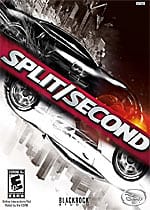Fake Cars. Fake Sets. Real Racing.
Split/Second is a unique game in the automotive genre. While other games in this genre have been striving towards realism and simulation-style gameplay, Split/Second takes the exact opposite approach. While other games offer stunning vistas and impressive garages full of the best cars the world has to offer, Split/Second gives users a fictional world full of fake cars to race around in. Although sim enthusiasts will be instantly put off by these elements, if you have ever enjoyed an arcade-style racer, then you owe it to yourself to check out Split/Second.
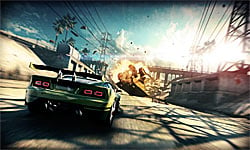
The premise of the game is fairly simple. You begin as an amateur stunt driver auditioning for a part on the automotive stunt show Split/Second. Of course, this “audition” represents the tutorial phase, but thankfully there isn’t very much to learn. When you hop in the car, you will be able to race around the television studio set, which has been fitted with all kinds of obstacles and props. However, it’s not just speed you’ll have to work with.
As you face off against your automotive opponents, you will be able to fill a special meter that is displayed behind your vehicle. This meter can be filled by drifting, drafting behind other cars, jumping over ramps, or nearly missing an obstacle. This meter has three different graduated sections, and once one of these graduations is filled, you can perform a “Power Play” which will cause something near an opponent to explode or collapse. If you have some good timing, you can throw opponents off-course or even crash them into other obstacles. When a car crashes as a result of a Power Play move, the car will be reset several places behind their original position. In addition to causing carnage, you can also use Power Plays to open new areas of the track and take shortcuts.
But no matter how you use them, Power Plays make up the bulk of Split/Second’s appeal. There are twelve different “sets” you can drive through, and each time you take to the road, you can use different Power Plays and begin developing a strategy for the game’s different modes. Although the game’s most prevalent mode is the straight-up race, there are also a number of others. Standard modes in the game’s Career include elimination, survivor, and time trial modes. Although these are pretty standard fare, Split/Second also has some that are really unique, including one where your job is to avoid missiles being fired from a helicopter! These modes fall right into the game’s gimmick, and are quite a bit of fun while you are playing the career mode. Unfortunately, many of these specialty modes are only available in the career mode, which can be disheartening if you thrive on the multiplayer circuit.
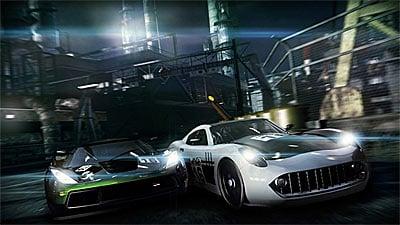
Although the game has plenty of different modes, it is hard not to come away from Split/Second feeling like the game itself is a little shallow. The game does feature twelve “episodes” which each comprise a handful of events, but once you have mastered the Power Play and dodged your 352nd missile, it is hard to find a reason to fire up the game again.
All of the game’s cars can be unlocked just by going through the game’s regular career mode, and the online mode only lets players participate in three different match types. I really wish there was more to Split/Second than just its career mode, and the lack of additional modes or features beyond the standard versus, quickplay, and online modes. With automotive games like Need For Speed: Shift and Forza Motorsports 3 ramping up the depth in the genre, it is hard to justify a purchase that has such little replay value.
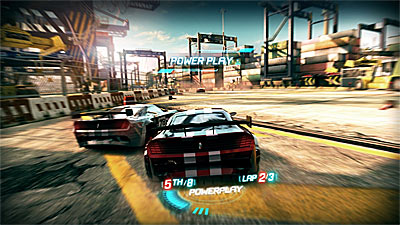
Despite the game’s lack of modes, its arcade style of gameplay makes this title very easy to pick up and play. The controls are very simple: use the triggers to accelerate/brake, and use two of the face buttons to use your Power Plays. Navigating and steering your vehicle is simple enough, but using the drift function is a little tricky, as the game doesn’t have the quick handbrake drift and instead uses a reaction-based, simple brake system to initiate drifting.
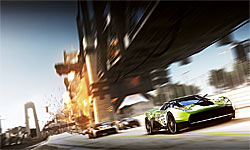
Still, after you get the hand of the drifting, the game is very easy to control and requires no precision to handle. Although this stays true to the game’s arcade format, it can make the gameplay feel a little shallow, and automotive fans may be a little disappointed with how simple the driving mechanics are.
Visuals in Split/Second, much like other aspects of the game, are fairly good, but not outstanding. Cars sport some detail, but they all follow a generic template. Tracks also feature some detail, but have a lot of common elements. The only real area where the visuals shine is the explosion animations, which look fantastic.
Split/Second is certainly not the best automotive title we have ever seen, but it gets one thing right: arcade-style racing. This game is ridiculously fun, and using the Power Plays to blow away the buildings, structures, and vehicles around you is a great gimmick to get players into this new franchise.
Unfortunately, this game suffers from being a little too shallow, and after playing the same tracks over and over, it’s a little too easy to tire of the game after the main story mode has been completed. Still, I would hope that there will be a sequel to this title, as the premise is solid. The execution just needs a little fleshing out.
RATING OUT OF 5 RATING DESCRIPTION 4.0 Graphics
Tracks sport a decent amount of detail and explosion effects are spectacular. 4.2 Control
Controls are very simple to learn, and while drifting can take awhile to master, the rest of the mechanics take mere seconds to pick up. 3.0 Music / Sound FX / Voice Acting
Music is generic, and sparse voiceover is unremarkable. Car noises are realistic but repetitive 3.6 Play Value
There isn’t much to do beyond the initial career mode, and the online offering is rather thin. 3.8 Overall Rating – Good
Not an average. See Rating legend above for a final score breakdown.
Game Features:
